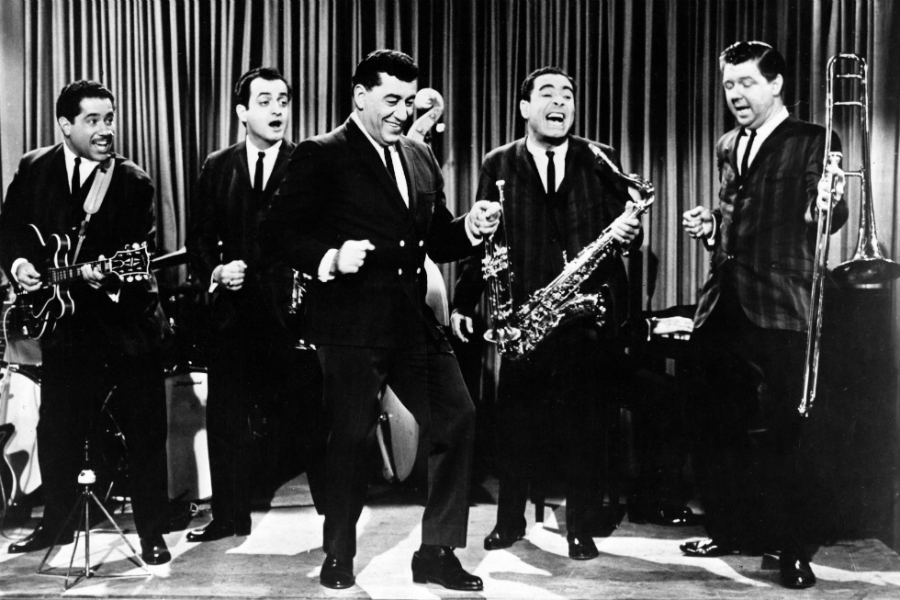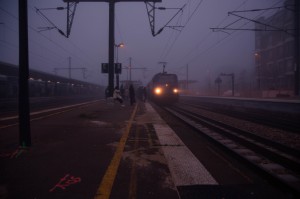When Melody Ruled the Airwaves

Artist Michael Lacey takes the playlist’s helm this week, to muse most vigorously on enjoying classic doo-wop, swing and jazz …
Music plays an important role in my artistic practice, keeping me tethered to sanity while engaged in various laborious, repetitive and RSI-inducing tasks, like cutting out a billion pictures of churches or trying to perfectly draw every tiny screw on a Victorian observatory telescope. The weeks spent engaged in these maddening activities provide an opportune window for cliche ‘frustrated artist’-type tantrums, which can be kept at bay with regular applications of doo-wop, swing, jazz and popular songwriting from pre-1960.
While generally speaking I have slightly broader tastes than this playlist would suggest, and would encourage readers to have a listen to recent output by Rudi Zygadlo and excellent local bands Clang Boom Steam and Lovecraft, these songs contain specific qualities that help me maintain creative momentum.
Where modern versions (either by pseudo-credible nu-jazz idiots like Jamie Cullum or the X-Factor when it’s ‘Rat Pack Week’ or whatever) are swamped in melody-obscuring vocal gymnastics or indulgent off-kilter soloing, these renditions are characterised by their restraint, maturity, emotional clarity and good humour, making for a much more rewarding and affecting listening experience.
Charles Burnett’s 1977 neo-realist film Killer Of Sheep, a loosely-plotted study of black culture in working class districts of Los Angeles, remained unreleased until 2007 as the production had failed to secure the rights to any of the music used.
One such piece was Dinah Washington’s 1960 single This Bitter Earth, which plays as the titular slaughterhouse-worker dances at home with his wife in a rare moment of calm. I think that the contrast between the inviting, delicate arrangement and largely bleak, miserable lyrics give the song a real poignancy and weight. The song cropped up again in Scorsese’s daft thriller Shutter Island but with the backing replaced by Max Richter’s dejected-sounding On The Nature Of Daylight, which misses the point entirely.
Leon Redbone’s early career explorations of jazz standards and tin pan alley classics resulted in a few great albums, but I’m particularly fond of his rambling version of Shine On Harvest Moon, in which he sounds genial and pissed. Sam Butera & the Witnesses appear twice, as Louis Prima’s backing band on Pennies From Heaven, and with their own instrumental take on La Vie en Rose. Both are infectiously playful, about twice the speed of the original versions, and a persuasive argument in favour of the saxophone generally.
Like the other instrumental tracks on the playlist (such as Dick Hyman’s The Crave, which is not just included by virtue of his name being hilarious), the lead melody is played with such vivid force of personality that nothing seems to be lacking. All of these recordings, along with Emile Ford’s rocked-up Slow Boat To China and Gene Vincent’s stripped-down Up A Lazy River, demonstrate the near-infinite capacity for interpretation these songs possess, while keeping the fundamental elements intact.
Additionally, the necessity of masking the often downbeat content of the lyrics with a cheerful, danceable melody results in songs that are basically designed to reveal their depths gradually and through repeated listens, unlike the vapid and manipulative rubbish that enjoys such depressing popularity now.
As music becomes increasingly ephemeral as a product and an experience, I find it is pleasant to become reacquainted with songs and artists who have weathered the test of time. Should you enjoy listening to this stuff too, most of these artists’ complete back catalogues can be found on CD for about a fiver.
Michael Lacey
Last chance to see Michael’s solo exhibition, After the Flood, this weekend at Mello Mello, 40-42 Slater Street





